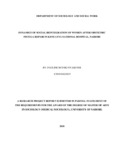| dc.description.abstract | Obstetric fistula refers to an injury to a woman’s pelvic tissue caused by obstructed, prolonged and unrelieved labour which can last up to several days. It is characterized by the presence of a hole between the vagina and bladder or vagina and rectum or both. This condition leads to total incontinence resulting in the passage of urine and/or faeces from the vaginal opening. Thus, it is a life changing condition and women suffering from the condition are likely to be stigmatized. Fistula is also associated with social problems such as stigma, isolation divorce among others as well as psychosocial problems such as depression, anxiety, sexual, fertility, and future childbearing challenges like inability to give birth and regulated birth interval. The above factors further contribute to survivors’ failure to seek treatment. This study was conducted to assess the dynamics of social reintegration of obstetric fistula survivors after repair in Kenyatta National Hospital, Nairobi, Kenya. The general objective was to establish the reintegration strategies employed to restore social functioning of fistula survivors. The study also sought to determine the effects of fistula on the survivor’s social life and how they cope, to establish the needs of fistula survivors and how they define their reintegration process and to assess the challenges encountered in the process of reintegration. During the study, a descriptive research design was adopted. Questionnaires and interviews were used to collect both qualitative and quantitative data. The study population comprised of 36 survivors and 20 key professionals and community informants. Stratified random sampling and purposive sampling techniques were used to acquire the sample of the survivors and key informants respectively. The results showed existence of reintegration efforts through post-operative services that are offered in the facility although their implementation is constrained by inadequate specialised personnel which in turn limits the survivors’ knowledge of the existence of such services. The study discovered various coping strategies that are utilized by the survivors such as self acceptance, high level of hygiene, religion, financial assistance, and food avoidance to cope with social, psychological and economic effects of obstetric fistula. In conclusion, the study established that for successful social reintegration of fistula survivors, different players who include the survivor, professionals, family members, and community members have different roles to play to help the survivor regain their social functioning. The study recommends an introduction of a comprehensive program that will engage the stakeholders to aid the survivors to actively participate in the community and undertake their social roles after the repair. Health policy and particularly the reproductive health policy should be reformulated to deliberately disseminate information on fistula in the existing safe motherhood initiatives to increase awareness. | en_US |



